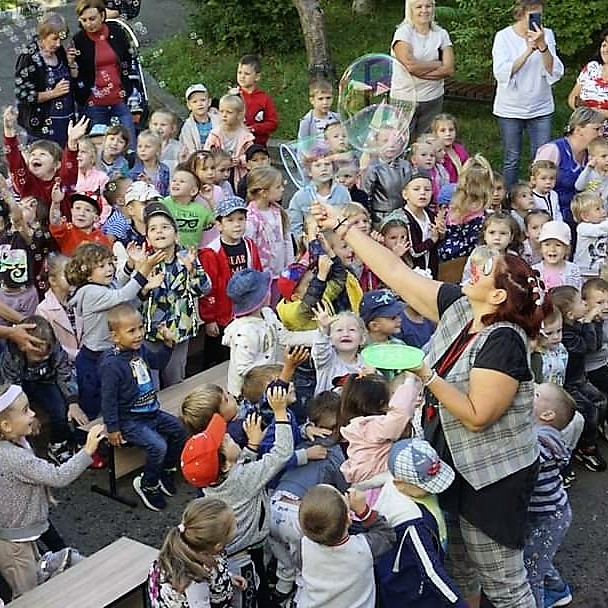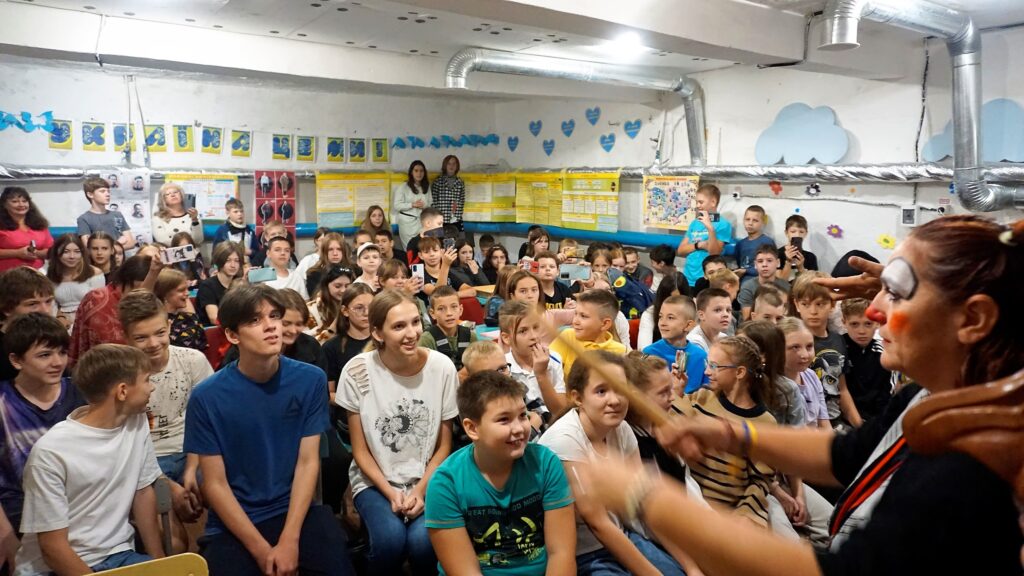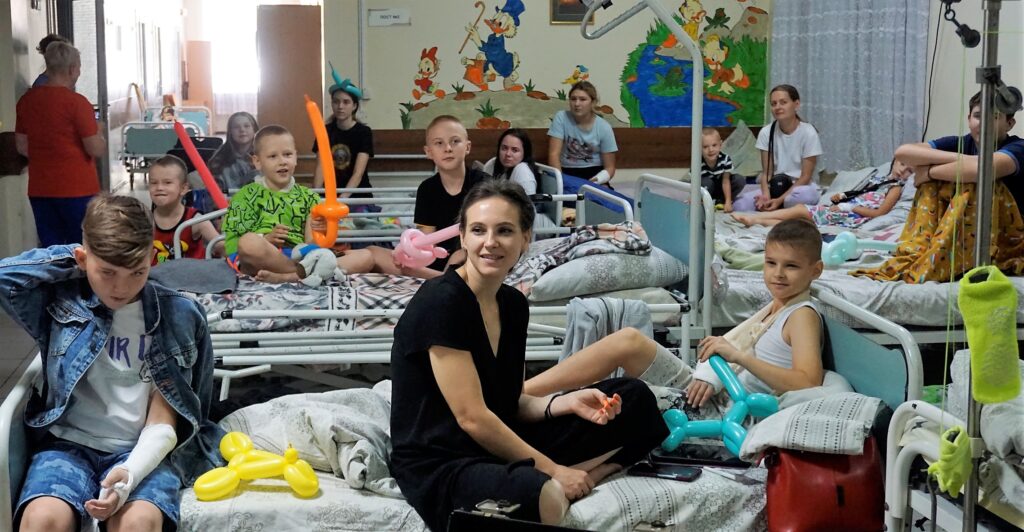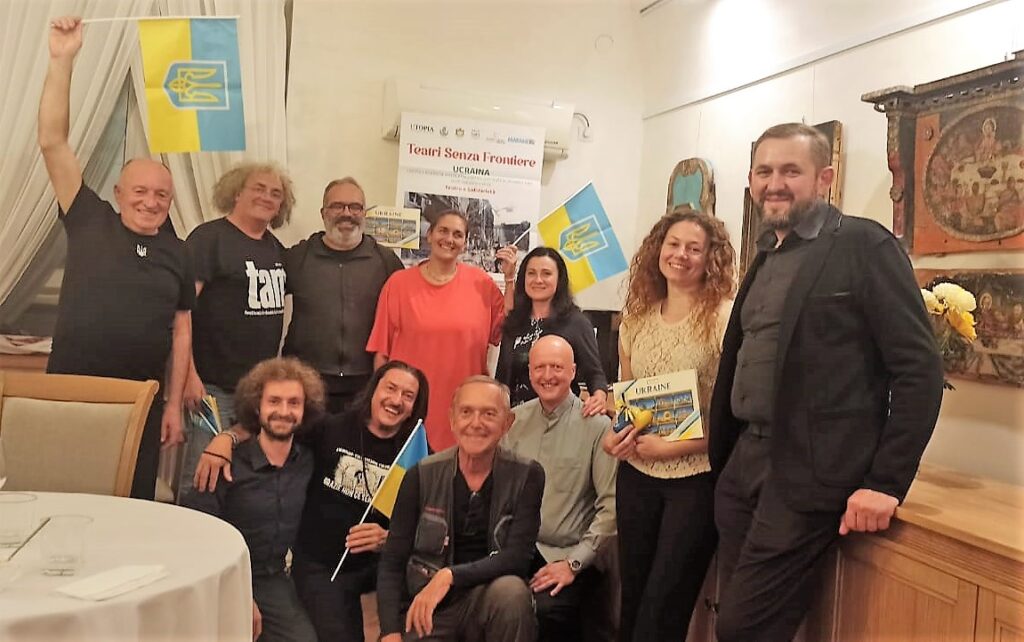
di Anna Rita Principi
Non solo materiale bellico viene inviato in Ucraina a sostegno di un esercito in guerra, non solo alimenti o abiti o altro materiale necessario per sopravvivere, ma anche – e per volontà di alcuni attori italiani di TEATRI senza FRONTIERE – il materiale di cui sono fatti sogni e speranze; quel materiale intangibile fatto di rapporti umani, vicinanza, amicizia, sorrisi e teatro.
Appena rientrato da una difficile e insolita tournee in Ucraina, sotto le bombe, Marco Renzi coordinatore del viaggio, ha condiviso con noi il bilancio di questa esperienza e le sue impressioni.
- Anzitutto, com’è nato il gruppo di TEATRI senza FRONTIERE?
Teatri senza frontiere è nato 14 anni fa, quando ero direttore artistico del Festival Teatri del Mondo che si tiene a Porto Sant’Elpidio, da me creato e diretto per 27 anni, fino al 2016. Quell’anno c’era stato il terribile terremoto all’Aquila e proprio allora decidemmo di proporre qualcosa di davvero innovativo: svolgere lo spettacolo inaugurale del Festival nelle tendopoli dell’Aquila. Si è trattato di un’esperienza davvero forte, anche perché il terremoto si era verificato da poche settimane…
Da lì è nata l’idea di voler reinterpretare il concetto di “internazionalità” in un Festival; noi siamo abituati a concepire l’internazionalità come “ospitalità”: ospitiamo, cioè una compagnia che viene dal Belgio o dalla Francia o da altri Paesi e questo dà – nell’idea generale – l’internazionalità ad un Festival.
La nostra idea è stata invece quella di essere noi con le nostre compagnie ad andare all’estero e realizzare progetti di spettacoli in alcune parti del mondo, di lì la nascita di TEATRI senza FRONTIERE. Come tutte le cose ha avuto un periodo di crescita che ancora verifichiamo, ha trovato un suo respiro, una sua ragione di essere.
- Qual è stato il primo progetto che avete realizzato con TEATRI senza FRONTIERE?
14 anni fa abbiamo cominciato con l’ONG di Porto San Giorgio Comunità Volontari per il Mondo e il suo Direttore Attilio Ascani con cui abbiamo organizzato spettacoli per i ragazzi di strada Etiopi, dove l’associazione opera.
- Come vengono “reclutati” gli attori che partecipano a TEATRI senza FRONTIERE?
Ogni anno preparo un bando di partecipazione e lo indirizzo a tutte le compagnie italiane professionali che lavorano nel teatro per ragazzi – perché è questo lo specifico di TEATRI senza FRONTIERE – indicando la méta e il periodo di partenza. Quindi al bando rispondono attori che volontariamente e senza alcun compenso decidono di unirsi al gruppo e partire.

- Com’è nato il viaggio in Ucraina?
Come ogni viaggio di questo tipo, anche quello in Ucraina è nato un anno fa, grazie al contatto con un attore Marco Rodari, detto Clown Pimpa, che è un clown di guerra e va dove ci sono situazioni di guerra; trovandosi in Ucraina ci ha messo in contatto con la Chiesa Greco Cattolica che non conoscevo prima e che ha tutte le caratteristiche formali della Chiesa Ortodossa – negli edifici sacri e nel rito – ma che riconosce Papa Francesco come punto di riferimento; l’altra particolarità è che i sacerdoti possono scegliere tra celibato e matrimonio, quindi molti di loro sono sposati.
- Chi sono stati dunque i vostri referenti là?
Soprattutto il rettore del Seminario dello Spirito Santo di Leopoli, Padre Ihor Boyko con cui abbiamo definito il programma dell’intero viaggio e Maksym Ryabukha, Vescovo ausiliare di Donetsk; a entrambi va certamente la nostra riconoscenza, poiché senza di loro non avremmo potuto fare nulla.
- Qual è stato il primo impatto nell’arrivare in un paese in guerra?
Il primo impatto è stato alla frontiera:arrivavamo da Cracovia in pullman e alla frontiera abbiamo aspettato circa cinque ore prima di passare e raggiungere Leopoli mezz’ora prima che scattasse il coprifuoco. La città era già completamente al buio, i nostri referenti ci hanno accompagnato ai nostri alloggi e nella notte per la prima volta abbiamo sentito le sirene antiaereo. Gli ucraini ci hanno mostrato dove fossero i bunker per rifugiarsi, ma hanno anche aggiunto che loro non ci sarebbero andati, perché tanto le sirene suonano continuamente giorno e notte e loro, ad un certo punto, hanno deciso di non scendere più nei bunker, ma di vivere comunque al di fuori… e così neppure noi ci siamo andati. Inoltre, mentre eravamo a Leopoli, abbiamo anche sentito un bombardamento che ha procurato due morti e dunque, come impatto direi che è stato piuttosto traumatico… ma il peggio doveva ancora arrivare…
- Parliamo però del “meglio” che avete vissuto in quella realtà: che reazioni avete avuto ai vostri spettacoli?
Gli spettacoli sono stati addirittura 31 nelle città di Leopoli, Briyhovychi, Stryi, Stradch, Zarvanutsya, Kherson, Kryvyi Rig, Dnipro, Zaporizhia, Karkiv, mai accaduto in tutti questi anni di TEATRI senza FRONTIERE…tutti seguiti con grande entusiasmo anche dai sacerdoti che ci hanno aiutato nell’organizzazione e che sembrano addirittura i più tenaci in questa resistenza. Fosse stato per loro avremmo dovuto fare cinque o sei spettacoli al giorno, ma siamo arrivati a quattro!
- E i ragazzi?…
Abbiamo fatto spettacoli sia per adulti che per bambini e ragazzi, soprattutto per i profughi scappati dal sud del Paese. E le reazioni sono state sempre forti per noi… sono emozioni che colpiscono: molte madri o anziani che hanno dovuto lasciare i loro territori e che a fine spettacolo ci abbracciavano commossi, ci hanno lasciato questa volontà di calore umano, di vicinanza davvero toccanti…
- Immagino che prima di partire vi siate informati attraverso i reportages dei nostri giornali o delle tv sulla situazione in Ucraina; ebbene, cosa avete notato o vi ha colpito stando lì che non avevate visto dai nostri mezzi di informazione?
Quello che ci ha maggiormente sorpreso è vedere la compattezza di quel popolo; personalmente non ce lo aspettavamo, una sorta di blocco granitico della loro volontà a resistere. Una unione che abbraccia tutti: uomini, donne, bambini, preti per raggiungere la vittoria finale.
- Questa esperienza di TEATRI senza FRONTIERE in Ucraina è stata unica nel suo genere…
Se si esclude il Clown Pimpa che lavora da solo, noi siamo stati la prima compagnia teatrale a lavorare là, in zona di guerra. E mi stupisce anche che a nessun altro in Europa sia venuto in mente di fare lo stesso… Abbiamo visto, sì, tanti pacchi di aiuti accatastati nelle chiese, ma quel popolo ha bisogno anche di un sostegno di altro genere. E credo che abbiano apprezzato proprio la nostra presenza fisica lì con loro; il fatto di non sentirsi completamente soli…
- Un teatro fatto per loro, mentre – magari – servizi fotografici o documentari, sono più documentazioni rivolte a noi che viviamo lontani da quelle realtà…
Sì, è proprio questo che hanno certamente apprezzato… l’ho avvertito… il fatto di aver portato uno spettacolo, un momento che acquisisce anche un significato speciale… se penso a Kherson quando durante lo spettacolo c’è stato un bombardamento e nessuno si è mosso… per un’ora i racconti e la musica hanno oscurato la guerra. Certamente non sono io che con il Teatro potrò vincere una guerra, ma posso dare il mio contributo e sentire, in coscienza, che siamo ancora esseri umani.
- Credo che un altro momento particolarmente toccante sia stato lo spettacolo all’ospedale pediatrico…
Senz’altro… eravamo a Zaporizhia, sempre accompagnati dal vescovo di Donetsk, abbiamo visitato diversi reparti e fosse stato per il vescovo avremmo dovuto fare chissà quanti altri spettacoli… Ma anche lo spettacolo nel bunker della scuola ci ha riservato emozioni molto forti… Ogni scuola deve avere un bunker la cui capienza determina la didattica in presenza; mentre eravamo lì hanno suonato le sirene e ci siamo spostati nel bunker, cosa che per loro sembrava assolutamente normale, mentre per noi un po’ più strana…

- Una ulteriore conferma del loro desiderio di normalità e di scelta di continuare a vivere…
Sì, questo è evidente ovunque, a Leopoli in maniera davvero eclatante: la sera esci e vedi tanti giovani e persone che frequentano i locali, artisti di strada e grande movimento. Ci diceva il rettore del Seminario che è questa la risposta migliore che vogliono dare, la vita contro chi li vorrebbe impauriti e nascosti.
- E’ possibile fare un confronto tra questa esperienza in Ucraina e le altre che TEATRI senza FRONTIERE ha svolto in Sud America o in Africa?
No, poiché negli altri Paesi abbiamo lavorato con i ragazzi “ultimi della Terra”… ragazzi di strada, quelli che dormono nelle discariche, i poverissimi… in questo ultimo viaggio non abbiamo incontrato poveri, qui c’è un popolo che – ripeto – in modo granitico resiste e vuole assolutamente la sua libertà e la sua indipendenza.
- Sarebbe bello poter tornare e proporre i vostri spettacoli nell’Ucraina pacificata e nei teatri ricostruiti…
In effetti siamo partiti con il loro invito a tornare l’anno prossimo, ma devo dire che abbiamo già avviato accordi sia con lo Zambia che con la Palestina, ma soprattutto per questa ultima, dobbiamo vedere lo sviluppo della situazione… dovremo valutare tanti aspetti, ma certamente torneremo in Ucraina. Non sappiamo ancora quando ma succederà.
- Vogliamo ricordare gli altri attori che con te hanno partecipato al viaggio?
Certo: il gruppo di TEATRI senza FRONTIERE di quest’anno era costituito da Noemi Bassani e Stefano Tosi della compagnia L’Arca di Noe di Varese; Gabriele Claretti dell’Associazione Ho un’idea di Lapedona (Fermo); Marco Pedazzetti della compagnia Filodirame di Brescia; Maurizio Stammati del Teatro Bertolt Brecht di Formia; Simona Ripari e Marco Renzi di Proscenio Teatro di Fermo. Le foto e la documentazione sono state curate da Ruggero Ratti.

Marco Renzi – E’ nato, vive e lavora nel fermano, da sempre si è occupato di Teatro: come Attore, Autore, Regista e Direttore Artistico. Ha scritto trentacinque spettacoli, tutti rappresentati, i suoi testi sono stati messi in scena sia da compagnie di tutta Italia che straniere.
E’ stato fondatore e Direttore artistico del Festival di teatro per ragazzi “Teatri del Mondo”, fondatore di “Teatri senza Frontiere” e della compagnia “Proscenio Teatro”.
THEATER OF WAR
by Anna Rita Principi
Not only war material is sent to Ukraine to support an army at war, not only food or clothes or other material necessary to survive, but also – and by the will of some Italian actors of THEATERS WITHOUT BORDERS – the material of which dreams and hopes are made; that intangible material made of human relationships, closeness, friendship, smiles and theatre.
Having just returned from a difficult and unusual tour in Ukraine, under the bombs, Marco Renzi, coordinator of the trip, shared with us the balance of this experience and his impressions.
– First of all, how was the THEATER WITHOUT BORDERS group born?
Theaters Without Borders was born 14 years ago, when I was the artistic director of the Teatri del Mondo Festival held in Porto Sant’Elpidio, which I created and directed for 27 years, until 2016. That year there was the terrible earthquake in L’Aquila and right then we decided to propose something truly innovative: holding the inaugural show of the Festival in the tent cities of L’Aquila. It was a truly powerful experience, also because the earthquake had occurred a few weeks before…
From there the idea of wanting to reinterpret the concept of “internationality” in a Festival was born; we are used to conceiving internationality as “hospitality”: we host, that is, a company that comes from Belgium or France or from other countries and this gives – in the general idea – the internationality to a Festival.
Our idea was instead to be us with our companies who went abroad and created show projects in some parts of the world, hence the birth of THEATERS WITHOUT BORDERS. Like all things, it had a period of growth that we are still experiencing, it found its own breathing space, its own reason for being.
– What was the first project you created with THEATER WITHOUT BORDERS?
14 years ago we started with the Porto San Giorgio NGO Community Volunteers for the World and its Director Attilio Ascani with whom we organized shows for Ethiopian street children, where the association operates.
– How are the actors who participate in THEATERS WITHOUT BORDERS “recruited”?
Every year I prepare a notice of participation and address it to all the professional Italian companies that work in children’s theater – because this is the specificity of THEATERS WITHOUT BORDERS – indicating the destination and the starting period. So actors respond to the call who voluntarily and without any compensation decide to join the group and leave.
– How did the trip to Ukraine come about?
Like every trip of this type, the one in Ukraine was born a year ago, thanks to contact with an actor Marco Rodari, known as Clown Pimpa, who is a war clown and goes where there are war situations; being in Ukraine put us in contact with the Greek Catholic Church which I had not known before and which has all the formal characteristics of the Orthodox Church – in sacred buildings and rites – but which recognizes Pope Francis as a point of reference; the other peculiarity is that priests can choose between celibacy and marriage, so many of them are married.
– So who were your other contacts there?
Above all the rector of the Seminary of the Holy Spirit in Lviv, Father Ihor Boyko with whom we defined the program of the entire trip and Maksym Ryabukha, Auxiliary Bishop of Donetsk. Our gratitude certainly goes to both of them, since without them we would not have been able to do anything.
– What was the first impact of arriving in a country at war?
The first impact was at the border: we arrived from Krakow by bus and at the border we waited about five hours before crossing and reaching Lviv half an hour before the curfew came into force. The city was already completely dark, our representatives accompanied us to our accommodations and in the night for the first time we heard the air raid sirens. The Ukrainians showed us where the bunkers were for refuge, but they also added that they would not go there, because the sirens sound continuously day and night and they, at a certain point, decided not to go down to the bunkers anymore, but to live outside anyway… and so we didn’t go there either. Furthermore, while we were in Lviv, we also heard a bombing which caused two deaths and therefore, in terms of impact I would say that it was rather traumatic… but the worst was yet to come…
– Let’s talk about the “best” you experienced in that reality: what reactions did you have to your shows?
There were as many as 31 shows in the cities of Lviv, Briyhovychi, Stryi, Stradch, Zarvanutsya, Kherson, Kryvyi Rig, Dnipro, Zaporizhia, Karkiv, which has never happened in all these years of THEATERS WITHOUT BORDERS… all followed with great enthusiasm even by the priests who helped us in the organization and they even seem to be the most tenacious in this resistance. If it were up to them we would have had to do five or six shows a day, but we ended up with four one day!
-And what about the children?…
We have done shows for both adults and children and teenagers, especially for refugees who have escaped from the south of the country. And the reactions have always been strong for us… they are emotions that are striking: many mothers or elderly people who had to leave their territories and who hugged us with emotion at the end of the show, left us this desire for human warmth, for truly touching closeness…
– I imagine that before leaving you informed yourself through the reports in our newspapers or on TV about the situation in Ukraine; well, what did you notice or strike you while standing there that you hadn’t seen from our media?
What surprised us most is seeing the unity of that people; personally we didn’t expect it, a sort of granite block of their will to resist. A union that embraces everyone: men, women, children, priests to achieve the final victory.
– This experience of THEATER WITHOUT BORDERS in Ukraine was one of a kind…
If we exclude Clown Pimpa who works alone, we were the first theater company to work there, in a war zone. And it also amazes me that no one else in Europe has thought of doing the same… We have seen, yes, many aid packages stacked up in churches, but those people also need support of another kind. And I think they appreciated our physical presence there with them; the fact of not feeling completely alone.
– A theater made for them, while – perhaps – photographic services or documentaries are more documentation aimed at us who live far from those realities…
Yes, this is exactly what they have appreciated… I felt it… the fact of having brought a show, a moment that also acquires a special meaning… if I think of Kherson when during the show there was a bombing and no one moved… for an hour the stories and music overshadowed the war. It is certainly not me who will be able to win a war with the Theatre, but I can make my contribution and feel, in conscience, that we are still human beings.
– I think another particularly touching moment was the show at the children’s hospital…
Without a doubt… we were in Zaporizhia, always accompanied by the bishop of Donetsk, we visited various departments and if it had been up to the bishop we would have had to do many other shows… But even the show in the school bunker gave us very strong emotions… Every school must have a bunker whose capacity determines in-person teaching; while we were there the sirens sounded and we moved into the bunker, which for them seemed absolutely normal, but for us a little more strange…
– A further confirmation of their desire for normality and choice to continue living…
Yes, this is evident everywhere, in Lviv in a truly striking way: in the evening you go out and see many young people and people frequenting the clubs, street artists and great movement. The rector of the Seminary told us that this is the best response they want to give, their lives against those who would want them scared and hidden.
– Is it possible to make a comparison between this experience in Ukraine and the others that THEATER WITHOUT FRONTIERS has carried out in South America or Africa?
No, since in other countries we have worked with the “last of the Earth” children… street children, those who sleep in landfills, the very poor… on this last trip we have not met poor people, here there is a people who – I repeat – in granitic way resists and absolutely wants its freedom and independence.
– It would be nice to be able to return and propose your shows in the pacified Ukraine and in the reconstructed theaters…
In fact we left with their invitation to return next year, but I must say that we have already started agreements with both Zambia and Palestine, but especially for the latter, we have to see the development of the situation… we will have to evaluate many aspects, but we will certainly return to Ukraine. We don’t know when yet but it will happen.
– Do we want to remember the other actors who participated in the trip with you?
Of course: this year’s THEATER WITHOUT BORDERS group was made up of Noemi Bassani and Stefano Tosi from the L’Arca di Noe company from Varese; Gabriele Claretti of the Ho un’idea Association of Lapedona (Fermo); Marco Pedazzetti of the Filodirame company of Brescia; Maurizio Stammati of the Bertolt Brecht Theater of Formia; Simona Ripari and Marco Renzi of Proscenio Teatro di Fermo. The photos and documentation were edited by Ruggero Ratti.
Marco Renzi – He was born, lives and works in the Fermo area and has always been involved in theatre: as an actor, author, director and artistic director. He has written thirty-five shows, all performed; his texts have been staged both by companies throughout Italy and abroad.
He was the founder and artistic director of the children’s theater festival “Teatri del Mondo”, founder of “Teatri senza Frontiere” and of the “Proscenio Teatro” company.


